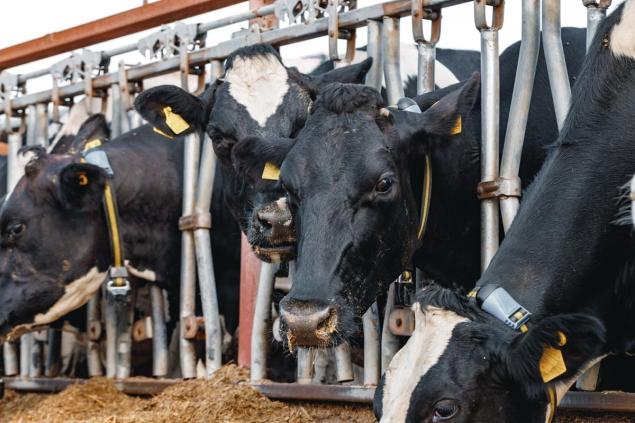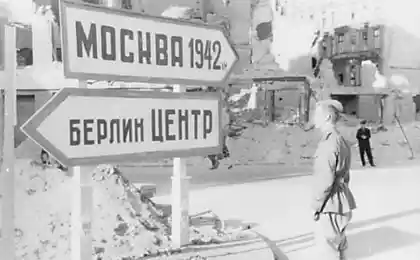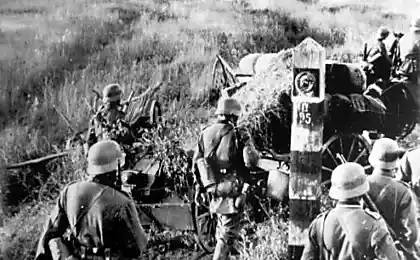182
What were the Soviet milkmaids and why now they cause sincere admiration
Working as a milkmaid has never been a leader among the dream professions of generations of Soviet youth. Moreover, she even feared: "Do not take up your mind - waiting for you to work as a milkmaid, cows will turn tails ..." Perhaps the words “milkmaid’s work” prompt the imagination to paint an edge with milky rivers and sour banks?
Working as a milkmaid
Then imagine this: every day, without a weekend, you wake up no later than four in the morning and go to the farm to the accompaniment of the vigilant neighbors' dogs. In any weather. And this time of day perceives exactly as the morning less than half of the year, and in late autumn, winter and early spring you are surrounded by a real night. On the farm waiting for cows, an average of twenty, and daily duties.
Every Burenka needs to be cleaned up. Each carefully and thoroughly wash the udder and wipe dry with a clean ironed cloth. Quickly and skillfully milk her, saying gentle words. To scratch the belly with the crest and between the horns...

Then you need to strain the milk, close the fifty-liter cans, load them on the car (you still need to live to milk trucks, as well as before the mechanization of the farm). Get the calves drunk. Remove straw bedding, replacing them with fresh. Give food and drink to wards. You've got three hours.
After lunch, closer to the evening, everything will repeat. Unless the dog barking will not be as loud as the early early, among the many sounds of the village and nature.
Lunch break. During the “break” you milk, feed, drink your cattle and poultry, clean in the barns of your own yard, cook food for households, wash, clean, take care of children. Notice that in spring, summer and autumn the garden and garden are also on you. And it is good if the husband and children want and can help.

And if the work as a milkmaid became your lot in the period from the end of December 1932 to August 28, 1974, provided that you did not live in the border area or in one of the Baltic republics, you were not allowed to have a passport. And somewhere within the country you could go, only having a certificate issued by the chairman of the village council.
It is not for nothing that the collective farmers at that time often told those whom they trusted, this is a joke: “Two brothers stole and they were tried.” One of them got a sentence. Arriving in the colony, he tells his cellmates how stupid he got caught.
- And how much did you get? asked one of the listeners.
- Seven years...

Peels — a lot, sympathize with him.
- Oh, come on! the guy replies, I will sit down and go out. And my brother is full of khana. .
- What, life?!
- Worse! They were ordered to work in the collective farm...
Hard work as a milkmaid. Hard work? Wrong word. Many people know that mother and grandmother worked as milkmaids in the collective farm. And they know very well that this is almost hellish work. And you look at photos in old magazines like “Peasant” – you wonder: all of them are beautiful, strong, funny! It would seem that what is so happy?! And how else to survive, not rejoicing in nature, beauty, family, friends who are ready to help, foaming fragrant milk, cows-breadwinners, that there is strength to love... And joke.

You know how Tamerlane collected tribute from the vanquished? He sent his officers and soldiers to the villages. They come back with nothing.
- O Lord! They have nothing left, sobbing, begging for mercy.
- Go back and search for each crevice and find it!
They followed orders. And they brought food and money and clothes to the camp. That's what they did. A year later, they came again for tribute. Returned with a meager loot, angry:
- Send us back there, sir. Laughing, sluts. I guess they hid a lot!
- Uh, no one's going anywhere! If you laugh, you won't find anything. Nothing because! .

So those Soviet milkmaids from old and often staged pictures with jokes, laughs encouraged themselves, reminding that they, without external freedom, could still feel internal freedom: it is impossible to dismiss them, and if they work here, then they see in the work meaning, their own importance, importance for society, for children and adults, despite the difficulties and the fact that society values their work in words, but in practice. In fact, for example, in 1980, at the cost of a liter of milk at 1 ruble, the state bought it from the collective farm for 30 kopecks per liter. You need a comment? I understand without them.
Known in the country of the period of stagnation, the beautiful milkmaid from Transcarpathia, Anna Fotul, for example, went to work on a farm at the age of 16, became a master of machine milking, for 25 years she tired of 1.8 million liters of a healing drink. This is equivalent to the capacity of 35 railway tanks. Can you imagine? And there were a lot of workers like that. How can you not admire such people and the fruits of their work?

Anna did everything. She lived in a happy marriage for more than thirty years, raised five children, waited for grandchildren. And without getting sick, she suddenly died at the age of 53. The verdict of doctors: the body overworked Statistics, alas, are silent about the untimely loss of health and life due to excessive fatigue among representatives of completely peaceful professions.
I am sure that work should be useful not only in results, but also in the process. And that not only work as a milkmaid, but also all the specialties of agriculture, it is high time to provide everything necessary so that people work not at the limit of their strength, but for joy.
You got any ideas?
Working as a milkmaid

Then imagine this: every day, without a weekend, you wake up no later than four in the morning and go to the farm to the accompaniment of the vigilant neighbors' dogs. In any weather. And this time of day perceives exactly as the morning less than half of the year, and in late autumn, winter and early spring you are surrounded by a real night. On the farm waiting for cows, an average of twenty, and daily duties.
Every Burenka needs to be cleaned up. Each carefully and thoroughly wash the udder and wipe dry with a clean ironed cloth. Quickly and skillfully milk her, saying gentle words. To scratch the belly with the crest and between the horns...

Then you need to strain the milk, close the fifty-liter cans, load them on the car (you still need to live to milk trucks, as well as before the mechanization of the farm). Get the calves drunk. Remove straw bedding, replacing them with fresh. Give food and drink to wards. You've got three hours.
After lunch, closer to the evening, everything will repeat. Unless the dog barking will not be as loud as the early early, among the many sounds of the village and nature.
Lunch break. During the “break” you milk, feed, drink your cattle and poultry, clean in the barns of your own yard, cook food for households, wash, clean, take care of children. Notice that in spring, summer and autumn the garden and garden are also on you. And it is good if the husband and children want and can help.

And if the work as a milkmaid became your lot in the period from the end of December 1932 to August 28, 1974, provided that you did not live in the border area or in one of the Baltic republics, you were not allowed to have a passport. And somewhere within the country you could go, only having a certificate issued by the chairman of the village council.
It is not for nothing that the collective farmers at that time often told those whom they trusted, this is a joke: “Two brothers stole and they were tried.” One of them got a sentence. Arriving in the colony, he tells his cellmates how stupid he got caught.
- And how much did you get? asked one of the listeners.
- Seven years...

Peels — a lot, sympathize with him.
- Oh, come on! the guy replies, I will sit down and go out. And my brother is full of khana. .
- What, life?!
- Worse! They were ordered to work in the collective farm...
Hard work as a milkmaid. Hard work? Wrong word. Many people know that mother and grandmother worked as milkmaids in the collective farm. And they know very well that this is almost hellish work. And you look at photos in old magazines like “Peasant” – you wonder: all of them are beautiful, strong, funny! It would seem that what is so happy?! And how else to survive, not rejoicing in nature, beauty, family, friends who are ready to help, foaming fragrant milk, cows-breadwinners, that there is strength to love... And joke.

You know how Tamerlane collected tribute from the vanquished? He sent his officers and soldiers to the villages. They come back with nothing.
- O Lord! They have nothing left, sobbing, begging for mercy.
- Go back and search for each crevice and find it!
They followed orders. And they brought food and money and clothes to the camp. That's what they did. A year later, they came again for tribute. Returned with a meager loot, angry:
- Send us back there, sir. Laughing, sluts. I guess they hid a lot!
- Uh, no one's going anywhere! If you laugh, you won't find anything. Nothing because! .

So those Soviet milkmaids from old and often staged pictures with jokes, laughs encouraged themselves, reminding that they, without external freedom, could still feel internal freedom: it is impossible to dismiss them, and if they work here, then they see in the work meaning, their own importance, importance for society, for children and adults, despite the difficulties and the fact that society values their work in words, but in practice. In fact, for example, in 1980, at the cost of a liter of milk at 1 ruble, the state bought it from the collective farm for 30 kopecks per liter. You need a comment? I understand without them.
Known in the country of the period of stagnation, the beautiful milkmaid from Transcarpathia, Anna Fotul, for example, went to work on a farm at the age of 16, became a master of machine milking, for 25 years she tired of 1.8 million liters of a healing drink. This is equivalent to the capacity of 35 railway tanks. Can you imagine? And there were a lot of workers like that. How can you not admire such people and the fruits of their work?

Anna did everything. She lived in a happy marriage for more than thirty years, raised five children, waited for grandchildren. And without getting sick, she suddenly died at the age of 53. The verdict of doctors: the body overworked Statistics, alas, are silent about the untimely loss of health and life due to excessive fatigue among representatives of completely peaceful professions.
I am sure that work should be useful not only in results, but also in the process. And that not only work as a milkmaid, but also all the specialties of agriculture, it is high time to provide everything necessary so that people work not at the limit of their strength, but for joy.
You got any ideas?
Charming Ukrainian from Kherson won the contest “Mrs. world 2023”, which was held in Miami
What you see in the picture first will tell you what kind of person you really are.























